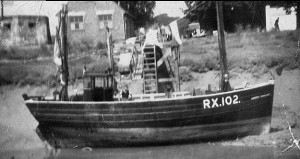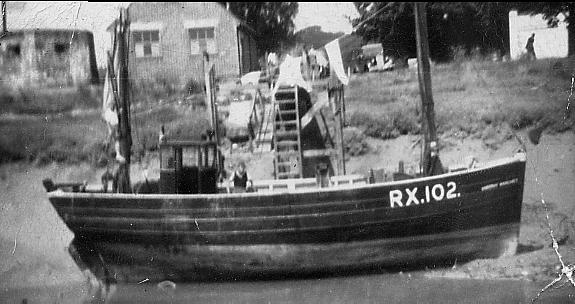By Jim Hollands
In Wartime Britain Rye became one of the few ports on the South Coast
allowed to send its fishing boats to sea. The beach boats of Dungeness,
Hastings and Eastbourne were unable to launch, due to the steel anti-invasion
barriers that were erected to stop the imminent German invasion.
Virtually no fishing took place during the initial war period and
stocks of fish had multiplied. The Mispah, carrying the number RX159
was skippered by a popular Rye fisherman, Charlie Locke. His crew
were two other seasoned fishermen, Joe Hollands and Bert Longley.
There were boats from Newhaven, Shoreham, Brighton, Folkestone and
Ramsgate working out of Rye but the knowledge of the local men working
their own ground was invaluable so it was the Rye boats that were
landing the biggest catches. The Mizpah on on occasion brought in
280 stun (stone) of gutted fish plus holding the last trawl in the
water till after the ship reached its moorings at the Fishmarket.
Clifford Bloomfield wrote in the “Wings over Rye” edition of Rye Memories.
“Large groups of the local townspeople would gather at the Fishmarket
to await the returning boats, they were able to buy generous quantities
of a variety of small fish from the catch. A sandbag full for one
shilling (5p.) Flats such as dabs, plaice, skate (referred to as May
Wing), Angler fish known as keddlemar, dog fish known as Robin Huss,
cod, whiting, John Dories, mackerel, herring etc. In this respect
Rye people were able to supplement their food rations very considerably.”
Unfortunately there was a price to pay. Mizpah was fishing in Rye
Bay on 16 September 1942. A solitary German Focke Wolf 190 fighter
dived and attacked the unarmed vessel. Mizpah was a sitting duck for
the German, returning from a raid or just on patrol. Joe Hollands
and Bert Longley were mortally wounded and Charlie Locke was also
hit by the bullets and cannon shells that tore through the boat, somehow he got Mizpah aground at Jury’s Gap where help was swiftly at hand. Sadly Joe and Bert were dead by this time. Charles Locke received the British Empire Medal for his efforts to save his crew.
The Dust Cart Outrage
Then came an incident which shocked the families of the dead fishermen
They were transported back to Rye in the Dust Cart! Their remains
were taken in the Town’s only refuse collecting vehicle to the mortuary
in the Ypres Castle. This incident was seen as a scandal by many and
there were indignant voices raised at the Town Hall as to who had
authorised this means of transport for two “Sons of Rye.”
Even after 65 years I myself still cringe when I think about the incident.
Joe Hollands was my Grandfather’s brother and the act of
bringing those two brave men, on their last journey to the town of
their birth in such an ignominious way, was outrageous.

The Mispah survived to fish another day and was still working out
of Rye for many years after the War had ended.
Another famous Rye fishing boat to survive the War was the Dorothy
Margaret. She went to Dunkirk and transported hundreds of soldiers
from the beaches to the naval destroyers which were ferrying the men
back to England. The Dorothy Margaret came under fire herself more
than once during the evacuation. She turned towards Dover as the Germans
moved into Dunkirk and had a safe journey home carrying one of the
last batches of troops to be snatched from the claws of the Nazi invaders.
The return of the bulk of the Expeditionary Force meant that Britain
could prepare for an invasion across the Channel with the nucleus
of its fighting force free to fight another day.
First Published in Rye’s Own September 2007
